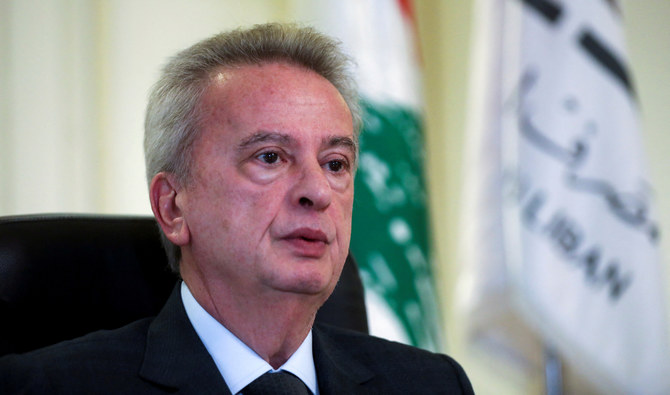BEIRUT: Lebanese President Michel Aoun on Thursday stressed that “the financial criminal audit of Banque du Liban (the country’s central bank) should reach practical results, while steering clear of personal interests.”
During a speech on Thursday to the recently formed National Anti-Corruption Commission, Aoun said the Lebanese people “have the right to know where their life savings went. Any party that says otherwise has certainly benefited from the wrong practices in managing the affairs of the state and its institutions, especially BDL. These parties are waging campaigns against me and continue to mislead public opinion.”
Judge Ghada Aoun, who is politically affiliated with the president, continues to insist that Riad Salameh, the governor of the bank, be prosecuted. On Wednesday, the judge decided to prosecute Maj. Gen. Imad Osman, head of the Internal Security Forces, for preventing officers from State Security from entering Salameh’s home in Rabieh on Tuesday.
The State Security officers were acting on a summons issued by Judge Aoun against Salameh after he failed to appear three times as a witness in a criminal case brought by the group The People Want to Reform the System over allegations of “unjust enrichment, money laundering and wasting public funds.”
The ISF’s General Directorate said: “The members in front of Salameh’s house have been stationed there for some time to protect him from any security threat and they are not authorized to interfere, report or prevent the implementation of any official memorandum. This was stressed during a call between Osman and the Director-General of State Security Maj. Gen. Tony Saliba as part of the continuous coordination between them.”
Observers see the ISF and State Security as having differing loyalties within Lebanon’s sectarian political system.
In April 2021, Judge Ghassan Oweidat, the public prosecutor, suspended Judge Aoun from cases related to major financial crimes and instead referred them to judicial inspection. Judge Aoun insisted on carrying on with her investigations, however, and issued a subpoena against Salameh as a witness, not a defendant. His lawyers submitted a request to dismiss Judge Aoun from the case but she refused to step down.
According to a BDL source quoted by Reuters: “Salameh is working normally from his office.”
Judge Aoun accused the security services of being “an accomplice” and added that she has the right “to punish any employee seeking to violate the rule of law.”
Her decision to take action against ISF chief Osman had political repercussions. MP Bahia Hariri, head of the Future Movement bloc, raised concerns with Prime Minister Najib Mikati. He assured her, according to a statement issued by his office, that he is “against Judge Aoun’s actions,” and said that Osman had correctly performed all his duties in complete coordination with the prime minister and the minister of interior.
Mikati added that the allegation against Osman “is pure slander and completely false.” He said he will take up the issue with Judge Oweidat and the justice minister to end “this persistence in attacking state institutions, their prestige and the dignity of those in charge of them.”
Hariri condemned “this suspicious silence on the part of judicial supervisory bodies regarding the legal violations committed by Judge Aoun in the name of the law, only to serve political goals and personal whims.”
President Aoun, meanwhile, criticized “incitement campaigns and false allegations by the Future Movement and those who go along with it.”
His media office said that the president will continue to demand answers about “the fate of $69 billion lost out of the $86 billion deposited by Lebanese banks in BDL, knowing that what the Lebanese state borrowed in foreign currencies from BDL did not exceed $5 billion.”
Economics expert Jassem Ajaka said there are several dimensions to the situation with Salameh.
“Should foreign banks find that there are legal risks in dealing with Lebanon, the BDL accounts may be closed,” he said. “This would have negative repercussions on imports and if the dollar exchange rate is affected, the budget deficit would increase and thus impact negotiations with the International Monetary Fund.
“The monetary situation is directly related to Salameh, and the financial issue is indirectly related to him because the government that approved the budget needs him to ensure a stable exchange rate.”
















